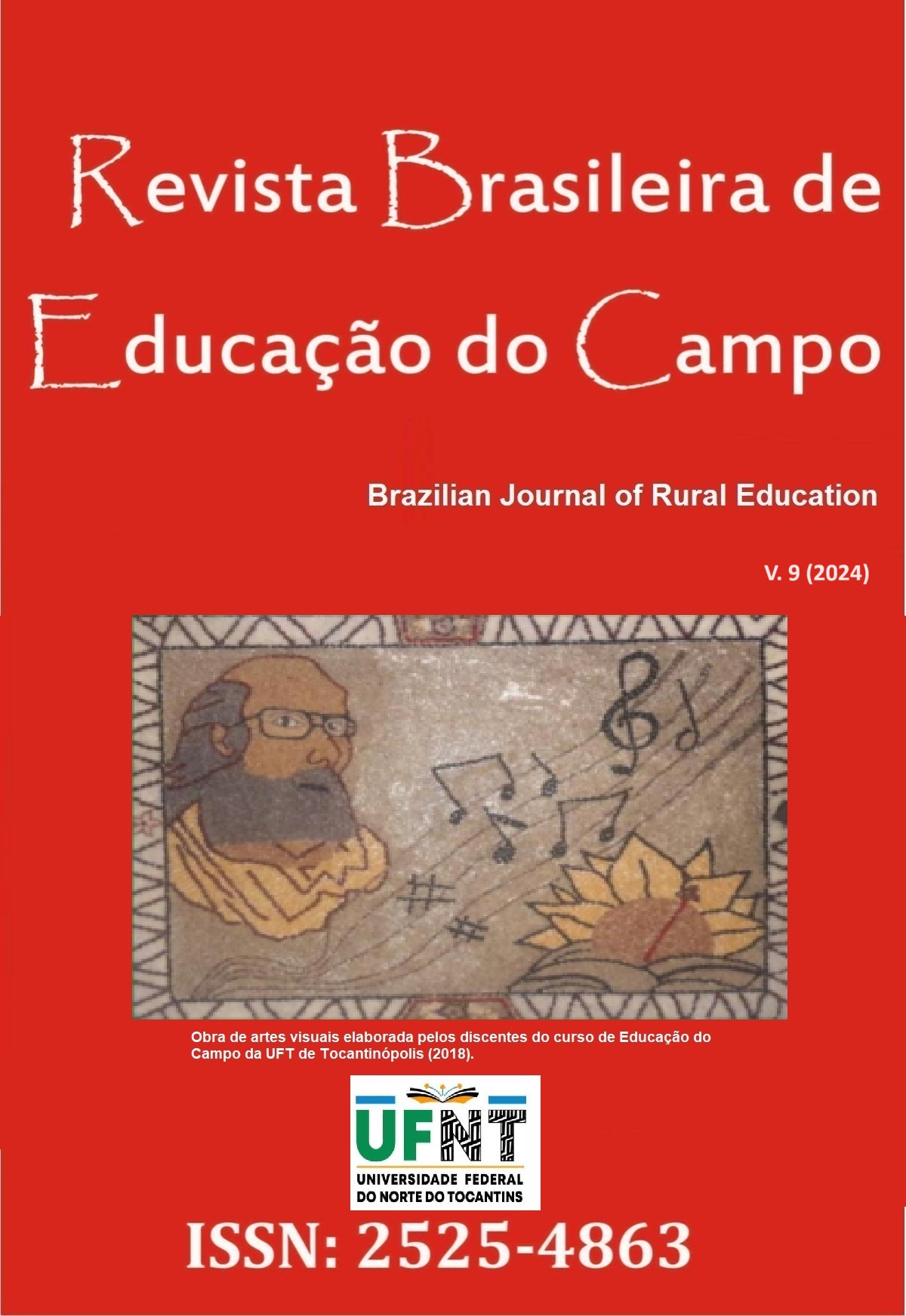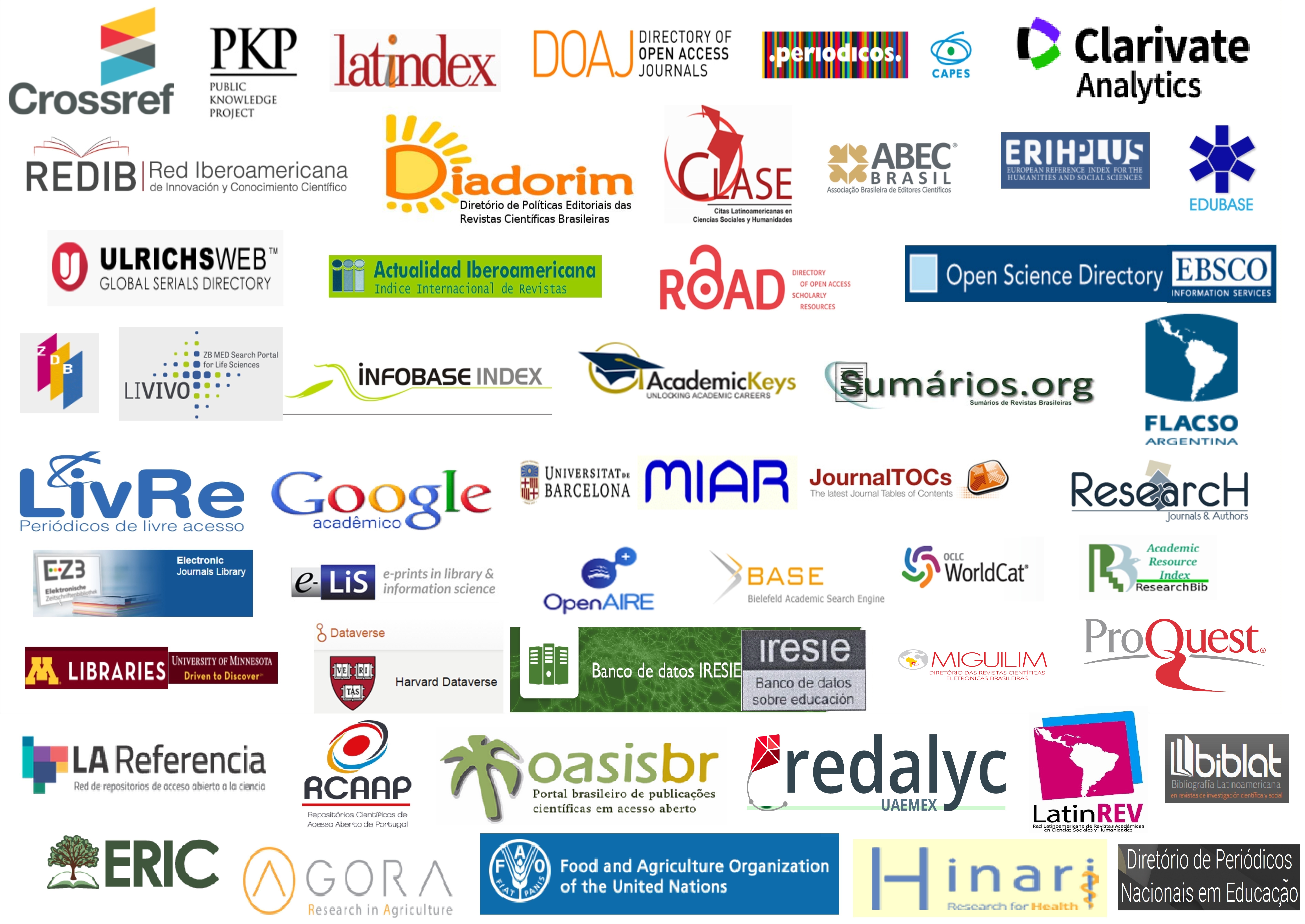Formação de professores para a Agricultura Sustentável: A adubação verde em debate
DOI:
https://doi.org/10.70860/ufnt.rbec.e19224Palavras-chave:
Educação, Formação de Professores, Agricultura SustentávelResumo
O presente artigo é instrumento por meio do qual problematizamos a importância da formação de professores orientada para a educação de qualidade e a agricultura sustentável, enquanto objetivos necessários para um processo societário que preze pelas necessidades humanas. Demonstramos a multidimensionalidade, o caráter processual, ético e científico do desenvolvimento sustentável e explicitamos a importância da adubação verde para a recuperação de áreas com solos degradados. Nosso objetivo é explicitar a adubação verde enquanto estudo e prática necessários na educação do campo. A metodologia utilizada se baseia na revisão bibliográfica e atuação prática na docência em curso de licenciatura em educação do campo e de agronomia. Concluímos com a necessidade de valorização de pesquisas e práticas de ensino que defendam a sustentabilidade, como a adução verde, em todas as dimensões na formação de professores.
Palavras-chave: educação, formação de professores, adubação verde.
Teacher Training for Sustainable Agriculture: Green Fertilization in Debate
ABSTRACT. This article is an instrument through which we discuss the importance of teacher training oriented towards quality education and sustainable agriculture, as necessary objectives for a societal process that values human needs. We demonstrate the multidimensionality, procedural, ethical and scientific nature of sustainable development and explain the importance of green manure for the recovery of areas with degraded soils. Our objective is to explain green manure as a necessary study and practice in rural education. The methodology used is based on a bibliographic review and practical teaching in a degree course in rural education and agronomy. We conclude with the need to value research and teaching practices that defend sustainability, such as green manure, in all dimensions of teacher training.
Keywords: education, teacher training, green manure.
Formación Docente para la Agricultura Sostenible: La Fertilización Verde en Debate
RESUMEN. Este artículo es un instrumento a través del cual problematizamos la importancia de la formación docente orientada hacia una educación de calidad y una agricultura sostenible, como objetivos necesarios para un proceso social que valore las necesidades humanas. Demostramos la naturaleza multidimensional, procesal, ética y científica del desarrollo sostenible y explicamos la importancia de la fertilización verde para la recuperación de áreas con suelos degradados. Nuestro objetivo es explicar la fertilización verde como estudio y práctica necesaria en la educación rural. La metodología utilizada se basa en una revisión bibliográfica y experiencia práctica en la impartición de una carrera de grado en educación rural y agronomía. Concluimos con la necesidad de valorar las investigaciones y prácticas docentes que defiendan la sostenibilidad, como la fertilización verde, en todas las dimensiones de la formación docente.
Palabras clave: educación, formación docente, fertilización verde.
Downloads
Referências
Abramovay, R. (2012). Muito Além da Economia Verde. São Paulo: Ed. Abril.
Barbieri, J. C., & Silva, D. (2011) Desenvolvimento Sustentável e Educação Ambiental: Uma Trajetória Comum com muitos Desafios. Revista Adm. Mackenzie, 12(3) 51-82. DOI: https://doi.org/10.1590/S1678-69712011000300004
Borges, W. L. (2018). Adubação Verde. EMBRAPA. Recuperado de: https://www.infoteca.cnptia.embrapa.br/infoteca/bitstream/doc/1102804/1/CPAFAPFDRAdubacaoverde.pdf. Último acesso: maio de 2024.
Cotton, D. R. E., Warren, M. F., Maiboroda, O., & Bailey, I. (2007). Sustainable development, higher education and pedagogy: a study oflecturers' beliefs and attitudes', Environmental Education Research, 13(5), 579 – 597. DOI: https://doi.org/10.1080/13504620701659061
Freitas, M. A. (2004). Educação para o Desenvolvimento Sustentável e a Formação de Educadores/Professores. Perspectiva, 22(02), 547-575.
Hungaro, O. A. L., Carvalho, M. A., Martinez, R. A. S., Roque, C. G., & Dallacort, R. (2024). Production systems and their impacts on the physical and microbiological characteristics of the soil in the Cerrado of Mato Grosso. Rev. Ciência Agronômica, 55(01), 203-226. DOI: https://doi.org/10.5935/1806-6690.20240010
Marconi, M. A., & Lakatos, E. M. (2003). Fundamentos de Metodologia Científica. São Paulo: Atlas.
Piato, R. S. et. al. (2014). Educação para o Desenvolvimento Sustentável: o papel da Universidade. Arch Health Invest, 4(4), 41-45.
Primavesi, A. (1992). Agricultura Sustentável. São Paulo: Nobel. Precisa.
Ruiz, D. R., Armentia, P. G., & Maldonado, C. C. (2019). Educación para el Desarrollo Sostenible: el papel de la Universidad en Agenda 2030. Revista Prisma Social, 25(25), 179-202.
Santos, D. G., & Romano, P. A. (2005). Conservação da Água e do Solo, e gestão Integrada dos Recursos Hídricos. Revista de Política Agrícola, 14(2), 51-64.
Sen, A. K. (2000). Desenvolvimento como Liberdade. São Paulo: Companhia das Letras.
Tavares, S. R. L. et. al. (2008). Curso de recuperação de áreas degradadas: a visão da Ciência do Solo no contexto do diagnóstico, manejo, indicadores de monitoramento e estratégias de recuperação. Rio de Janeiro: EMBRAPA Solos.
Zonta, J. H. et. al. (2012) Práticas de Conservação de Solo e Água. EMBRAPA, circular técnica 133, 01-24. Recuperado de: https://www.embrapa.br/busca-de-publicacoes/-/publicacao/928493/praticas-de-conservacao-de-solo-e-agua. Último acesso: maio de 2024.
Downloads
Publicado
Como Citar
Edição
Seção
Licença
Copyright (c) 2024 Rafael Rossi, Cassiano Garcia Roque

Este trabalho está licenciado sob uma licença Creative Commons Attribution 4.0 International License.
Proposta de Aviso de Direito Autoral Creative Commons
1. Proposta de Política para Periódicos de Acesso Livre
Autores que publicam nesta revista concordam com os seguintes termos:
a. Autores mantém os direitos autorais e concedem à revista o direito de primeira publicação, com o trabalho simultaneamente licenciado sob a Licença Creative Commons Attribution que permite o compartilhamento do trabalho com reconhecimento da autoria e publicação inicial nesta revista.
b. Autores têm autorização para assumir contratos adicionais separadamente, para distribuição não-exclusiva da versão do trabalho publicada nesta revista (ex.: publicar em repositório institucional ou como capítulo de livro), com reconhecimento de autoria e publicação inicial nesta revista.
c. Autores têm permissão e são estimulados a publicar e distribuir seu trabalho online (ex.: em repositórios institucionais ou na sua página pessoal) a qualquer ponto antes ou durante o processo editorial, já que isso pode gerar alterações produtivas, bem como aumentar o impacto e a citação do trabalho publicado (Veja O Efeito do Acesso Livre).
Proposal for Copyright Notice Creative Commons
1. Policy Proposal to Open Access Journals
Authors who publish with this journal agree to the following terms:
A. Authors retain copyright and grant the journal right of first publication with the work simultaneously licensed under the Creative Commons Attribution License that allows sharing the work with recognition of its initial publication in this journal.
B. Authors are able to take on additional contracts separately, non-exclusive distribution of the version of the paper published in this journal (ex .: publish in institutional repository or as a book), with an acknowledgment of its initial publication in this journal.
C. Authors are permitted and encouraged to post their work online (eg .: in institutional repositories or on their website) at any point before or during the editorial process, as it can lead to productive exchanges, as well as increase the impact and the citation of published work (See the Effect of Open Access).














